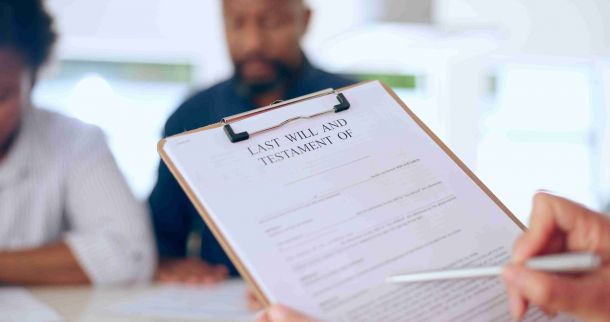How To Cash An Estate Check (Guide)
Getting an estate check in the mail can feel confusing.
On the surface, it looks like any other check, but the moment you try to cash it, the bank starts asking for documents, IDs, and account details you may not have yet.
All this can feel overwhelming, especially when you’re already dealing with the stress of handling someone’s estate.
The good news is the process isn’t as scary as it seems once you know the order of steps.
In this post, we’ll show you exactly how to cash an estate check.
Table of Contents
ToggleWho Can Cash An Estate Check?
Estate checks are tied directly to the person who passed away, and banks are super strict about making sure the money goes to the right place.
That means not just anyone can cash it.
Usually, the executor or personal representative of the estate is the one who can deposit or cash an estate check. This is the person the court has officially appointed to handle the deceased person’s financial matters.
If you’re that person, you’re basically the “authorized signer” for the estate.
If the check is written directly to a beneficiary, then that beneficiary can usually just cash or deposit it in their own account.
Also Read: Can A Transfer On Death Deed Be Contested?
But if the check is written to the deceased person or to the “Estate of [Name],” then only the estate account can accept it.

So unless you’ve been given official authority by the court or the check is specifically in your name, the bank isn’t going to let you cash it.
How To Cash An Estate Check
Cashing an estate check has a few steps, but once you understand the flow, it’s not as intimidating as it seems. Here’s how to do it step by step:
#1 Gather Legal Documents
Before you can touch that estate check, you’ll need proof that you’re legally allowed to manage the estate. Banks won’t just take your word for it.
At a minimum, you’ll usually need:
- The death certificate
- Court-issued document naming you as the executor (Letters Testamentary) or administrator (Letters of Administration).
Some banks might also ask for your ID and the will itself if there is one.
Without these, you’re going to hit a wall at the bank. They won’t even consider letting you open an estate account or cashing that check. So step one: get your paperwork in order.
#2 Apply For An Estate EIN (If Not Already Done)
An EIN as the estate’s version of a Social Security number.
The IRS uses it to track taxes tied to the estate. Most banks won’t let you open an estate account without it, so it’s something you’ll need early on.
Thankfully, applying for an EIN is quick and free through the IRS website. You’ll answer a few basic questions about the deceased and the estate, and you’ll get the number right away.
Don’t overthink it, it’s just an ID number, not a full tax return.
You’ll use it for the account, for filing estate tax forms, and for anything else official tied to the estate’s money.
Also Read: How Much Does A Trust Cost To Maintain?
#3 Open An Estate Bank Account
Once you’ve got the legal documents and the EIN, it’s time to open an estate account at a bank.
The account will be in the estate’s name, not yours, which keeps everything neat and separate.
This account is basically the “hub” for all estate money. Any checks payable to the estate go here. Debts and bills tied to the estate get paid from here. When it’s time to distribute what’s left to beneficiaries, it all flows out of this account.
Keeping it separate protects you, makes probate smoother, and shows everyone involved that the funds are being handled properly.
#4 Endorse The Check Properly
You can’t just flip the check over and sign your name. The bank needs the endorsement to clearly show that the estate, not you personally, is receiving the funds.
Most of the time, it’ll look something like this:
“Estate of [Deceased Person’s Full Name], by [Your Name], Executor.”
If you’re the administrator instead of an executor, you’d swap in “Administrator.”
Each bank might have its own preferred wording, so before you sign, call or ask a teller to confirm how they want it.
Also Read: Can A Power Of Attorney Cash A Check After Death?
#5 Deposit The Funds Into The Estate Account
With the endorsement done right, you’re ready for the last step: depositing the check.
Make sure you get a receipt for the deposit, and keep a record of the check amount, the date, and where it came from.

Those details matter because you’ll need to show where all the estate’s money went when probate wraps up. It’s also a good habit so you don’t lose track of funds along the way.
Once the money is in the account, you can use it for estate expenses or eventually distribute it to beneficiaries, depending on the probate timeline.
Special Situations
Of course, life is rarely neat and tidy, so sometimes estate checks come with curveballs.
One common scenario is when the check is made out directly to the deceased person. In that case, you can’t just put it into your personal account, even if you’re a child or spouse. It has to go into the estate account.
Sometimes, if the estate is very small, your state may offer a simplified process through something called a small estate affidavit.
This lets you collect assets without going through full probate.
In these cases, banks may accept the affidavit along with your ID so you can handle the check without opening a full estate account.
There are also government-issued checks, like tax refunds, that might be made out to the deceased. Again, those typically have to go into the estate account unless you qualify for a simplified process.
Basically the exact process depends on how the check is written and the size of the estate.
Common Mistakes You’d Want To Avoid
There are a few common mistakes people make when dealing with estate checks.
Avoiding them will save you time, money, and headaches:
- Trying to cash the check in your personal bank account. Banks won’t let you.
- Endorsing incorrectly. The bank is picky, and if it’s not worded exactly right, they won’t accept it
- Forgetting to keep records. Probate courts often want to see where every dollar went. If you don’t keep good notes, you’ll be stuck retracing steps later.
- Sitting on the check too long. Some checks expire after 90 or 180 days, and then you’ll have to request a reissue.
Bottom Line
Cashing an estate check might sound complicated, but it’s not that difficult.
If you’re the executor or personal representative, gather your documents, get the EIN, open the estate account, endorse carefully, and deposit the funds. If you’re a beneficiary, you’ll only be able to cash it directly if the check is written to you by name.
And things get messy like unusual checks, out-of-state issues, or questions about probate, don’t hesitate to ask a probate attorney for help.
Sometimes just a short consult can save weeks of frustration.
Disclaimer: This material is intended for general information purposes only and does not constitute legal advice. Responses to inquiries, whether by email, telephone, or other means, do not constitute legal advice, nor do they create or imply the existence of an attorney-client relationship.

Matthew Reinaker grew up in Lancaster, Pennsylvania and moved to Virginia after high school to attend the University of Richmond. There, he received his undergraduate degree, Juris Doctor, and Master of Business Administration. In law school, Matt held the Executive Editor role for the Journal of Law & Technology, served as a justice on the Honor Council, and interned at the US Attorney’s Office. Matt also had the rare and fortunate opportunity to serve as a caretaker for and live in the Bottomley House, a beautiful on-campus bed and breakfast.
After law school, Matt worked for Williams Mullen before serving as Chief Operating Officer for Restoration Builders of Virginia, a Richmond home renovation company. Combining his passion for law and business operations, Matt formed Asurest, a mobile law firm dedicated to improving the process of estate planning and serving client needs in the comfort of their own homes.
Asurest Locations
Richmond, VA
Location
6610 Monument Avenue
Richmond, VA 23226
Phone
Hours
Mon-Fri 8am–8pm
Sat & Sun Closed




